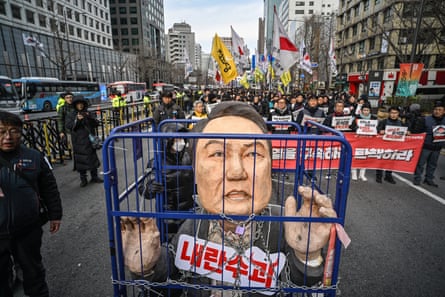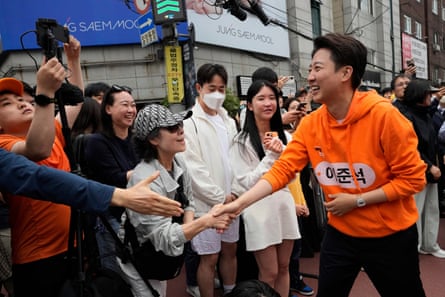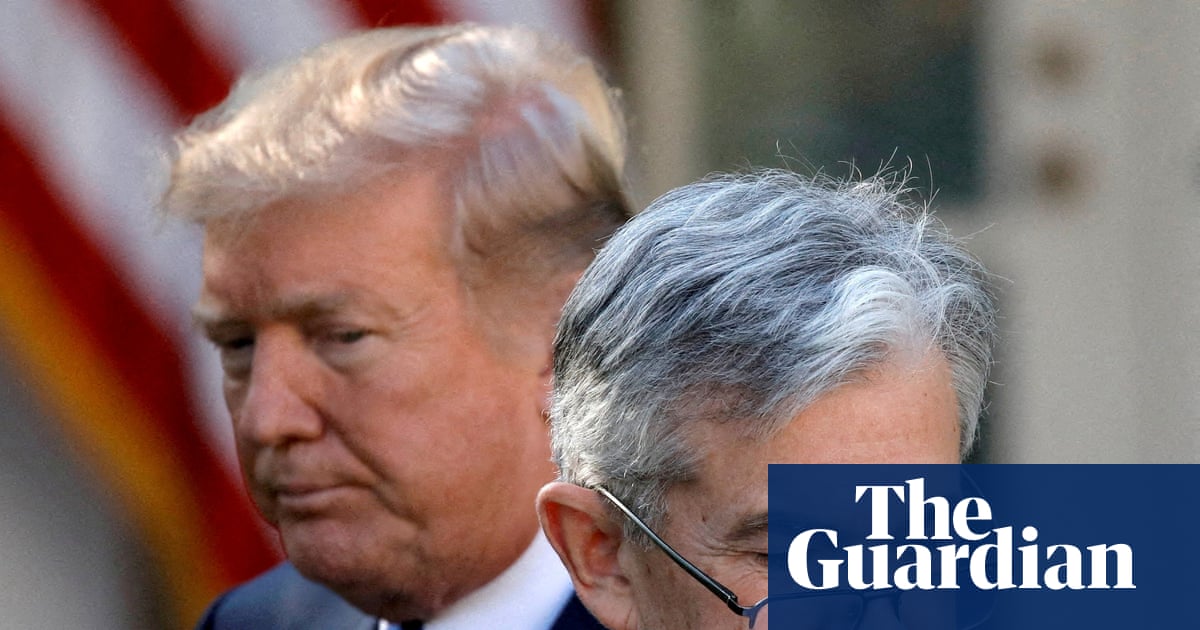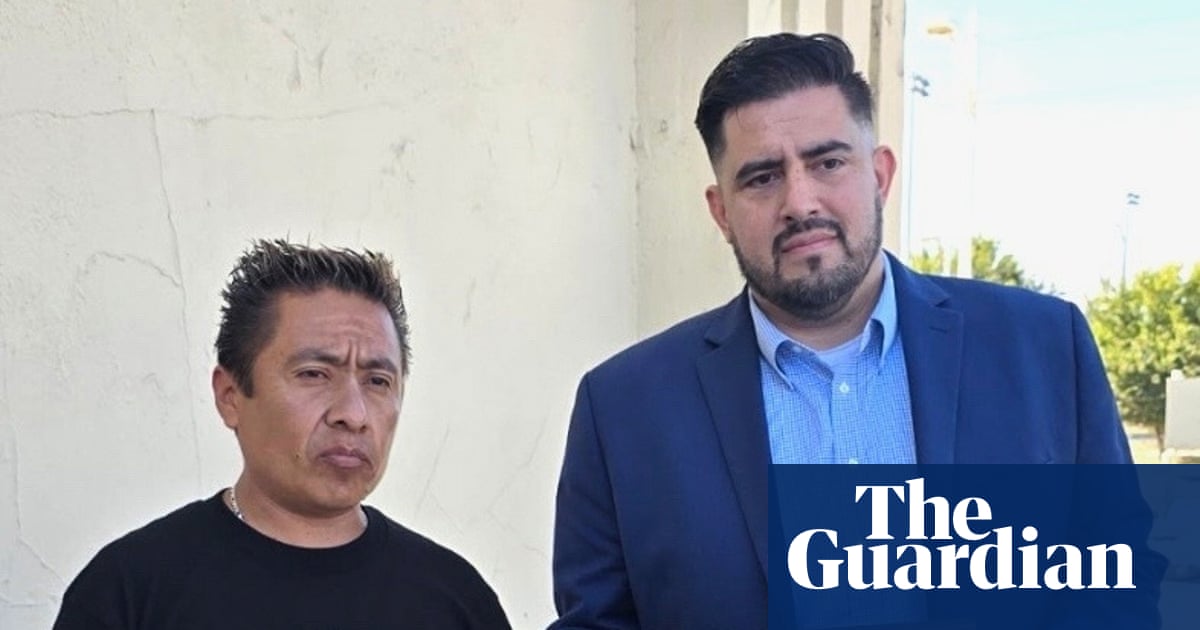On a November evening in 2023, in the South Korean city of Jinju, a woman called On Ji-goo was working the late shift at a convenience store when a young man stormed in, aggressively knocking items off the shelves. When she asked him to be careful, he turned to her, saying, “I’m angry to my bones right now, so don’t touch me.”
The situation escalated. When On tried to call for help, he seized her phone and threw it in the store’s microwave. She tried to stop him and he grabbed her by the collar and arms, dragging her several metres while slamming her into display shelves. It was the start of a brutal assault. Throughout it, he repeatedly said he “never hits women” but feminists “deserve to be beaten”.
When an older male customer tried to intervene, the attacker turned on him, too, demanding, “Why aren’t you supporting a fellow man?” When the police arrived, he announced he was part of a men’s rights group and called for male officers to handcuff him. He later admitted he had singled out On because of her short hair.
“Before this, I had only the most basic understanding of feminism – the kind any woman might naturally have,” says On, an aspiring author who uses a pen name.
We meet on a sunny afternoon in a coffee shop in Jinju, where she still lives, just blocks from the shop. It’s a sleepy provincial city of under 350,000 people, four hours from Seoul by high-speed train. On’s face is hidden behind a face mask, a beanie pulled low. Having endured insensitive questioning from local media in the aftermath of her assault, she takes a while to drop her guard. “I didn’t fully grasp the discrimination women face, or rather I had accepted it as normal,” she says.
The attack left her with permanent hearing loss and severe trauma. The perpetrator received a three-year prison sentence. In a landmark ruling, the appeals court recognised misogyny as the driving force behind the assault, the first time a South Korean court had acknowledged such hatred as a criminal motive.
On’s story is not unique in a country where systemic inequality and virulent online misogyny have pitched mainly gen Zs and millennials into a bitter battle of the sexes. While similar fights over gender and feminism are playing out across the world, from the US to Europe, South Korea has become ground zero for gender wars, its highly connected, digitally literate population amplifying this trend at a pace not seen elsewhere.
On the surface, South Korea appears a hypermodern society, defined by its positive contributions to global pop culture, cutting-edge technology and sleek urban landscapes. But beneath this veneer lies a widening gender divide that seems to belong to another era. Among nations of the Organisation for Economic Co-operation and Development, the country ranks first for women’s tertiary education attainment, yet maintains the bloc’s largest gender pay gap. Women remain largely excluded from leadership roles, and South Korea consistently ranks last in measures of workplace gender equality. While the country leads the world in internet connectivity and hi-tech innovation, these same digital spaces have become breeding grounds for some of the most toxic anti-feminist communities, turning virtual hatred into real-world violence.
The most horrifying manifestation of this came in 2016, when a 23-year-old woman was brutally murdered in a public bathroom near Seoul’s Gangnam station, in the heart of the business and entertainment district. The killer, who waited hours for a random female victim, told police he did it because “women have always ignored me”. The case became a watershed moment, sparking massive protests, yet the digital targeting of women continued. By 2018, it had become so normalised that it was routine to see signs in public toilets confirming they had been checked for hidden cameras, and thousands of women protested over an epidemic of spy cameras and “revenge porn”. The crisis deepened in 2020 with the notorious “nth room” case of digital sexual slavery, in which users of a network of Telegram chatrooms blackmailed women and underage girls into producing sexually explicit material at home. In 2024, a new threat emerged: deepfake pornography targeting schoolgirls, with perpetrators, often minors themselves, using AI technology to superimpose women’s faces on to sexually explicit content and distribute the images through Telegram channels, some with hundreds of thousands of members.
These digital crimes didn’t emerge in a vacuum. In the darkest corners of South Korea’s internet, young men gather anonymously to share their rage. While the west has 4chan and Reddit, South Korea has Ilbe – “daily best” – which at its peak in the mid-2010s ranked among the top 10 most visited websites in the country. The forum’s influence reaches far beyond the digital realm. Its users pioneered derogatory terms such as kimchi-nyeo (“kimchi girl”, often translated as “kimchi bitch”) to mock women as materialistic gold-diggers. These terms soon infiltrated mainstream discourse, with media outlets adopting -nyeo suffixes in headlines to critique any woman behaving badly in public.
As its influence grew, Ilbe began to radicalise, aligning itself with far-right politics and orchestrating provocative offline stunts. In 2014, an Ilbe user detonated a homemade explosive at a progressive activist’s talk, claiming the speaker was pro-North Korea – a common rightwing accusation in a country where the left-right divide remains shaped by cold war divisions – while others taunted families of those who died in 2014’s Sewol ferry disaster by gorging on pizza in front of bereaved parents on hunger strike as part of their demand for new legislation following the tragedy.
While Ilbe’s popularity has waned, its legacy endures in online communities known as namcho, short for namseong chogwa, meaning “excess of men”. These manospheres have spread across forums and messaging apps, allowing young men to share grievances about feminism and what they see as reverse discrimination.

“If you get access to the open internet before you get formally educated, your worldview will be fucked,” says Kim Min-sung, speaking at his office in Guri, a city on Seoul’s eastern edge. The 22-year-old activist, once an anti-feminist himself, speaks with an infectious energy, punctuating serious points with bursts of laughter.
Like many Korean boys, Kim encountered these forums at a young age. He recalls searching for innocent content, such as funny videos, only to be gradually exposed to misogynistic material. He admits he repeated anti-feminist rhetoric without understanding it, simply because it was what everyone around him did.
Kim’s turnaround came via an unlikely source: fantasy role-playing games. Here, he found a community that was predominantly female and progressive. At first, he says, “I kept my mouth shut and just played Dungeons & Dragons. But listening to them, you just naturally have casual conversations and you realise the worldview you had from these online forums was just exaggerations, caricatures and fantasy.”
Today, Kim runs the Korean Game Consumer Society, fighting the same online hatred he once participated in. He now receives regular death threats he says he finds oddly validating. All the same, “I’m just battling symptoms. I don’t think what I’m doing is solving the core of the problem. Men don’t know why they got into this place, they don’t know why they became unhappy.”
According to professor Seungsook Moon, a sociologist and gender studies expert at Vassar College in the US, the anger exploding online reflects deeper societal shifts. She traces young men’s discontent to South Korea’s embrace of neoliberalism. “Before democratisation, when military regimes ruled Korea, the government could create stable jobs,” she says. “Up to the late 80s, men with only a college education could get jobs in good companies. The economy was expanding rapidly.” But by the mid-90s those men were being laid off and “when social hierarchy changes, groups used to more powerful or privileged positions will respond with intense emotional reactions to their loss of status and respect”.
This resentment is acute around military service – a mandatory 18 months for able-bodied men that many view as an unfair burden in today’s precarious economy. It’s not a new grievance: in 1999 the constitutional court ruled against the military service bonus point system, which had granted veterans additional points in public sector job applications. The court found it discriminated against women and people with disabilities, intensifying many young men’s sense that they were losing traditional privileges without gaining new protections.
The sense of male victimhood is widespread: a 2021 Hankook Research survey found that while only 38% of men in their 20s believed women face serious discrimination in society, 79% believed men do. Seventy per cent of men in their 30s saw themselves as victims of gender discrimination.

Into this landscape of frustration have stepped new voices claiming to represent young men’s interests. Among them is New Men’s Solidarity, whose influence became clear when On’s attacker proudly declared his membership. The group and its leader, Bae In-gyu – South Korea’s answer to Andrew Tate – rack up millions of views on YouTube with content blaming feminism for young men’s struggles. Bae claims it is a “mental illness” and a “social evil”, and has sparked outrage by declaring the “nth room” victims were “whores”.
Bae’s rise reflects the shift of Korea’s anti-feminist movement from online anonymity to real-world action. Polished and theatrical, he presents himself in crisp suits, addressing crowds on protest stages or from atop vehicles, blending his rhetoric with broader far-right Korean politics, fervently anti-China, anti-North Korea and anti-communist. Like his western counterparts, he positions feminists as an existential threat, “extreme misandrists” who “advocate for female supremacy” with “the specific purpose of causing gender conflict”. Referring to himself as “hyung” (older brother), Bae cultivates an affectionate bond with disaffected young men, rallying them to fund his activism with donations.
This approach has inspired a broader ecosystem of anti-feminist content creators such as “cyber wrecker” PPKKa, a masked YouTuber with more than a million subscribers who was suspended from making money on YouTube for mocking women’s concerns about deepfake pornography. Together, these digital personalities have built on the legacy of earlier male rights activists such as Sung Jae-gi of the Man of Korea group, whose suicide in 2013 – jumping from a bridge to raise the profile of his organisation – created a martyr figure for the movement Bae would later rebrand and radicalise.
These anti-feminist voices have had a critical influence on the country’s politics. On 27 May this year, four candidates vying to become South Korea’s next president went head to head in a national TV debate. Lee Jun-seok, a 40-year-old Harvard graduate and leader of the relatively minor conservative Reform party, posed a graphic question to a rival: “If someone says they want to stick chopsticks into women’s genitals or some place like that, is that misogyny?” Lee’s comment sent shock waves across the country. Social media exploded with outrage, university students held press conferences demanding Lee withdraw from the race and women’s groups filed complaints with police.

Lee first gained prominence as a pundit, arguing that the younger generation “had not experienced gender-based inequality” and that policies such as quotas for women were “anachronistic”. As with Jordan Peterson in the west, Lee’s elite credentials and articulate style gave intellectual legitimacy to views that had been confined to anonymous namcho forums.
His anti-feminist messaging was adopted by former president Yoon Suk Yeol, who saw how effectively such rhetoric could mobilise young male voters. When running for office in 2022, this ex-prosecutor with no prior political experience claimed there was “no structural gender discrimination” in South Korea. In a move that foreshadowed the Trump administration’s assault on diversity, equity and inclusion programmes in the US, Yoon promised to abolish the country’s gender equality ministry, arguing that it focused too much on women’s rights and was no longer necessary. The strategy proved decisive in one of the closest presidential races in South Korean history, with Yoon winning by just 0.73% – fewer than 250,000 votes. Exit polls revealed a dramatic gender divide among young voters: nearly 59% of men in their 20s supported Yoon, while 58% of women the same age backed his progressive opponent.
after newsletter promotion
Under Yoon’s presidency, budgets were slashed for programmes preventing violence against women and the words “gender equality” were removed from government policies and school curriculums. On the night of 3 December 2024, Yoon made a shocking announcement: he was declaring martial law to combat “anti-state forces” and accused the opposition-controlled parliament of being a “den of criminals”. Within hours, troops had surrounded the National Assembly and politicians were seen jumping over gates and pushing past soldiers to convene an emergency vote. The decree was ended just six hours after it began.
This was followed by months of mass protests demanding Yoon’s removal, led overwhelmingly by young women. At Seoul’s ancient Gyeongbokgung Palace, Jeong Yeong Eun of the Seoul Women’s Association helped coordinate the “Yoon Suk Yeol out” feminist rallies, where participants took turns denouncing the administration’s attacks on women’s rights. “When he declared martial law, it was a natural extension of how his administration had been undermining democracy and excluding women’s voices,” she told me at the time. These demonstrations continued through the bitter Seoul winter. “People frame it as if women just appeared for the first time,” Jeong said. “We were always there in previous protest movements. We’re determined not to let our contributions be erased and to make our voices heard.”

In April, South Korea’s constitutional court unanimously upheld Yoon’s impeachment, finding his declaration of martial law a “grave betrayal of the trust of the people”. The snap election that followed in June 2025 would see Lee Jae Myung of the Democratic party emerge victorious with 49.42% of the vote.
But it was Lee Jun-seok who would come to symbolise the depth of South Korea’s gender divide. His chopsticks remarks may have cost him votes, but they solidified his appeal among his core supporters. While he got just 8.34% of the vote nationally, the exit poll breakdown revealed yet another stark gender and age divide: nearly one in four men in their 20s voted for him, along with 17.7% of men in their 30s. Dismissive of the mainstream candidates, they had rallied behind a figure who embodied their resentments about feminism, military service and what they saw as reverse discrimination. Even new president Lee Jae Myung seemed to take up this cause in July when he asked his cabinet to research “male discrimination” and develop countermeasures.
This political divide along gender lines isn’t unique to the country: it’s part of a global pattern where young women lean left while young men drift right. However, nowhere is the “ideology gap” more extreme than in South Korea, where the intensity of the divide stems from a collision between economic pressures and changing values, according to political scientist Min Hee Go at Ewha Womans University in Seoul. “It’s about who gets more of the pie, be it material resources, job opportunities, even good partners,” she says. “It is very cut-throat, especially in an environment where young people have to compete in an unprecedented way.”
This year’s election also issued a stark warning about the future of women’s participation in South Korean politics. For the first time in 18 years, none of the six candidates for president was a woman.
As the gender war has intensified, even the anti-misogynists have sometimes adopted toxic tactics. What began as “mirroring” – flipping misogynistic rhetoric to target men – has spiralled into increasingly extreme forms of resistance. When male forums mocked women’s bodies, the feminists of Megalia – an online community that emerged in 2015 – ridiculed penis size. When women were called “kimchi bitches”, Megalians coined terms for men such as hannam-chung (“Korean male bug”). Though Megalia has now closed, it has become a convenient bogeyman for those seeking to delegitimise feminist activism.
In the past year, global attention has turned to the fringe “4B” movement, which advocates complete withdrawal from a system it sees as irredeemably patriarchal. Its adherents reject dating, marriage, childbirth and any romantic relationships with men.
Such radical responses have helped fuel a broader backlash against feminism. Even men and women who support gender equality now often distance themselves from the term, which has become akin to a slur. Today, the mere accusation of having feminist sympathies can trigger public apologies from companies.
In 2023, a seemingly innocuous animation in a promo for the game MapleStory sparked a firestorm. It showed a character’s hand gesture transitioning from a fist to a heart, but male gamers claimed one frame resembled a feminist hand signal mocking small male genitalia. Within hours, online forums had erupted. The studio issued an apology, and anonymous users combed through the social media accounts of female employees, searching for proof of feminist sympathies. When they found a female artist who fitted their perceived enemy, they demanded her immediate firing.
The company, initially ready to comply, changed course only after intervention from the Korean Game Consumer Society, which convinced management to stand firm against the online mob. Ironically, it was later revealed that the animation had been designed by a male artist in his 40s. Despite this, the female artist was doxed online and harassed with sexual insults.
Some activists are working quietly to address the root causes of South Korea’s gender divide. In his cosy, cabin-like office near Seoul’s Mangwon market, Lee Han is preparing to travel across the country, leading classroom discussions about gender-based violence. It’s a delicate balance – schools often tell him to avoid discussing anything deemed controversial. But Lee and his group, Feminism With Him, insist dialogue is the only way forward: “We need to speak up and share what we’ve learned.” What began in 2017 as a small book club reading feminist texts soon evolved into something more ambitious. Now, with eight active members, they organise discussions, attend political rallies and work to create spaces for honest dialogue about gender.

Lee’s approach is shaped by his own journey through military service: “It was miserable. You can’t even put your hands in your pockets, can’t listen to music, can’t easily drink or smoke. Having your freedoms taken away is traumatic and terrifying.” Now he also teaches gender equality to military leaders and senior officers, arguing that men who channel their resentments at women have picked the wrong target. “Who created this system? Men, not feminists. Male politicians and the establishment thought: men are strong, women are weak, so don’t send women to the military,” he says. Despite pressure for reform, the defence ministry says it has no plans to introduce female conscription.
Efforts to address these issues face fierce resistance, particularly from South Korea’s powerful conservative Christian lobby, which has successfully blocked anti-discrimination legislation for almost two decades. “I’ve been prevented from speaking at schools because they complained I was promoting feminism,” Lee says. Yet he and his colleagues remain determined. While their numbers are small, their work offers hope that dialogue is possible. “Young men can’t express their fears and anxieties,” Lee says. “In male culture, especially in Korea, where hierarchy is so important due to Confucian values, you can’t speak up to those above you. So where does that frustration go? It gets directed sideways, at women, the easier target.” By creating safe spaces for men to discuss these issues openly, groups such as his aim to redirect that anger towards constructive change.
Back in Jinju, On is still recovering from the attack – she recently spent a month in hospital dealing with trauma. After a year dominated by court proceedings, she just wants to get back to normal: “I want to find work, treat my family to meals and buy toys for my cat.”
She has been moved by how many strangers have rallied to her cause. When a petition calling for her attacker to be punished reached 50,000 signatures in less than a month, she created a social media account to thank her well-wishers. Gradually she began posting detailed updates about her court proceedings, drawing so many supporters to the trial that some had to stand. She continues to share news about similar cases, which she sees as a small act of solidarity with other victims.
“I wouldn’t have survived the year without the people who stood by me,” she says. For On, the solution isn’t about fighting over who suffers more discrimination. “We need to focus on how to resolve these conflicts and create a safer society for everyone,” she says.

 3 months ago
46
3 months ago
46

















































